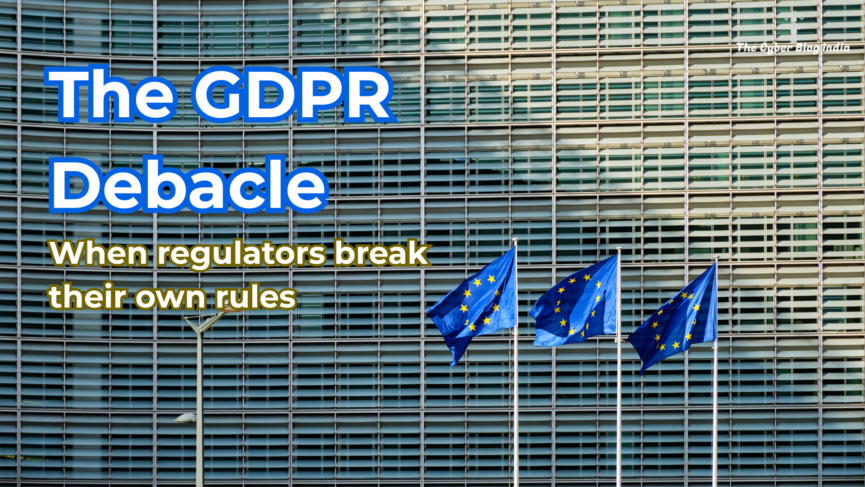The GDPR Debacle: When regulators break their own rules

Ironically, the European Commission, the institution that created the General Data Protection Regulation (GDPR), violated its own stringent rules. This case serves as a stark reminder that we must hold regulators accountable. In this article, we find out what happened, why it matters, and how this historic decision affects developing countries like India.
Context
This was a moment when one German citizen took on the European Commission. It started when they registered for the “GoGreen” event on the Conference on the Future of Europe website. Using the “Sign in with Facebook” option, his personal data was transferred to Meta platforms in the US. The website also used Amazon CloudFront, which transfers data to Amazon Web Services under comparable conditions.
Consequently, these transactions sparked concerns. Why? Because there was no proof of measures like standard contractual terms to secure the data. At the time of the transfer, the US did not have an “adequate” level of data protection under the EU legislation. The General Court ruled that the European Commission committed a sufficiently serious breach of the GDPR obligations, leaving the citizen worried about his data security. Consequently, the court awarded him €400 in damages.
The Breach and the GDPR’s Core
The GDPR, widely touted as the gold standard for data protection, relies on fundamental ideas such as transparency, accountability, and data minimisation. To provide protection equivalent to that offered within its borders, it also applies stringent requirements on transferring personal data outside the EU. The European Commission failed in this case on multiple grounds. They are:
-
Breach of the right to privacy: The EU Commission, as the enforcer of GDPR, eroded confidence in the system by violating the following key provisions:
- Article 5(1)(1): Mishandled data transfers lacked transparency.
- Article 44: Failed to ensure adequate protection for international transfers.
-
Illicit data transfers: The Commission violated Articles 44 to 49 of the GDPR by allowing IP addresses and other personal information to be transferred to US-based companies without adequate security measures.
-
Lack of Scrutiny: The Commission relied on Amazon and Meta’s systems without enough scrutiny to ensure compliance.
More General Implications
This verdict has significant ramifications for European and international institutions and data privacy advocacy, underlining the importance of strict compliance and robust data protection. This judgment is a wake-up call for the European institutions. It reinforces that even regulatory bodies are not above the law, especially considering the strict penalties imposed on private entities under the GDPR. This judgment sets a precedent on the basis of heightened scrutiny of EU institutions, calling for improving their data security measures.
Moreover, this case has implications beyond Europe. Companies worldwide that process the personal data of EU citizens must reassess their compliance mechanisms. Cross-border data transfers must comply with the stringent protections of GDPR, especially to countries without an adequacy ruling.
Further, this case highlights one of the fundamental strengths of GDPR, i.e., accountability. Moreover, any loopholes underscore the need for stricter enforcement and fair data protection. Consequently, the GDPR is reaffirmed as a robust, though still evolving, framework.
India and its Consequences
India is in the early stages of data protection journey, with the Digital Personal Data Protection Act, 2023 and the 2025 Draft Rules. Indian lawmakers may well take lessons from the errors made by the EU Commission in trying to establish an effective data protection regime. Some of these learnings can be:
-
Institutional Accountability: It is important that the regulatory bodies also adhere to the same criteria that India sets up when it implements its full-fledged data protection framework. This ensures openness and trust.
-
Cross-Border Data Transfers: India needs to handle the intricacies of data transfers with nations such as the US. Establishing precise rules and obtaining strong agreements are essential to avoiding mistakes like the ones the EU has encountered.
-
Focus on Safeguards: All protections pertaining to individual rights should be specified in procedures like standard contract terms. Localisation criteria for data should be readily implemented.
This judgment is a timely wake-up call for the Indian companies dealing with the European market. In a world turning increasingly data-sensitive, compliance is as much about customer trust and goodwill as it is about avoiding fines and penalties.
Takeaways for Companies
The companies, regardless of size, should consider the following takeaways in their data protection compliance journey. First, they should conduct proper due diligence before integrating third-party services. Second, they should perform regular audits to find and fix weaknesses and regularly assess compliance frameworks. Third, they should conduct training programmes for their team to avoid unintentional breaches of data protection law. Fourth, companies operating in multiple jurisdictions must thoroughly comply with applicable legislations in those countries.
Conclusion
The European Commission’s GDPR breach shook the data privacy community. This episode reminds one how even the strongest frameworks must be watched, monitored, and open to change. Rather than just a warning, this case is an opportunity for the data protection community to embrace accountability. At the end of the day, any watchdog’s credibility ultimately rests on its capacity to follow through on its commitments.
